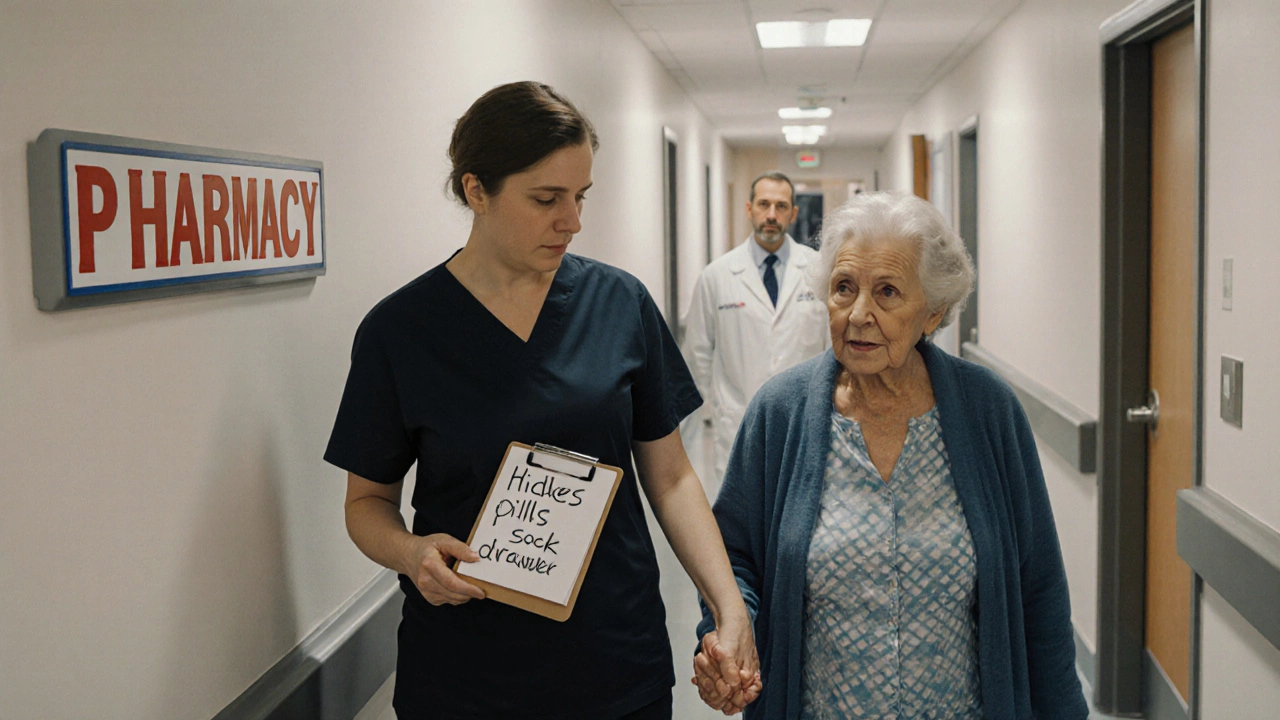Getting a loved one with dementia to a doctor’s appointment isn’t just about showing up on time. It’s about managing confusion, reducing anxiety, and making sure the medical team gets the full picture - all while keeping the person calm and safe. For many families, medical escort services are the only way to make these visits happen without breakdowns, missed diagnoses, or emotional trauma. But not all escort services are built the same. The difference between a routine ride and a truly effective medical escort comes down to training, preparation, and understanding how dementia affects behavior, communication, and memory.
Why Standard Transportation Falls Short
A regular taxi or rideshare driver might get someone from point A to point B, but they won’t know how to respond when the person refuses to get out of the car, thinks they’re being kidnapped, or starts yelling because the lights in the vehicle are too bright. Dementia isn’t just memory loss - it’s a rewiring of perception. Sounds become louder. Faces become unfamiliar. Time gets scrambled. A simple question like “Are you ready to go?” can trigger panic if the person doesn’t understand what’s coming next.Medical escort services trained in dementia care don’t just drive. They anticipate. They adapt. They use techniques proven in clinical settings - like validating emotions instead of correcting facts, using visual cues instead of verbal instructions, and building trust before the appointment even begins.
Pre-Appointment Preparation: The Most Important Step
The best medical escort doesn’t show up at 9 a.m. and say, “Let’s go.” They call the day before. They ask: “What time does your loved one usually wake up? What do they eat for breakfast? What music calms them? What words do they respond to best?”These aren’t small details. They’re the foundation. A person with mid-stage Alzheimer’s might be more alert in the morning. If an appointment is scheduled for 3 p.m., they’ll likely be agitated by the time they arrive. Scheduling matters. So does routine. If the person always sits in the same chair after lunch, the escort should plan to leave from there - not from the bedroom, where they might resist leaving.
Some services now use a “dementia profile” form filled out by family members. It includes: preferred name (some patients respond better to childhood names), common triggers (e.g., white coats, loud voices), favorite phrases (“We’re going for a drive”), and past reactions to medical settings. This isn’t optional - it’s essential.
On the Way: How to Reduce Anxiety During Transit
The car ride is where most meltdowns happen. Why? Because the environment is unpredictable. The person doesn’t know where they’re going, why they’re going, or who the driver is. Even if they’ve been to the clinic before, dementia erases that memory.Effective escorts use three simple strategies:
- Keep it quiet. Turn off the radio. Avoid sudden noises. Background music, if used, is soft instrumental - no lyrics. Studies show that familiar melodies from the 1940s-60s can reduce agitation in up to 70% of dementia patients.
- Use visual cues. Show a photo of the clinic or the doctor. Hold up the appointment card. Say, “We’re going to see Dr. Lee. Remember? She checked your heart last time.”
- Stay calm and match their energy. If the person is quiet, speak softly. If they’re restless, move slowly. Never rush. Never argue. Saying “You’re wrong” or “That’s not true” will only escalate things.
One escort service in Perth tracks their success rate by how often patients cry or scream during transit. Their top performers have a 92% success rate - meaning fewer than 1 in 12 rides include a crisis. That’s not luck. It’s protocol.

At the Clinic: Acting as a Communication Bridge
Doctors often have 15 minutes per patient. They ask, “How are you feeling?” and expect a clear answer. But someone with dementia may say, “I’m fine,” even if they’re in pain. Or they may repeat the same phrase over and over because they can’t form a new thought.This is where the escort becomes critical. They’re not just a helper - they’re a translator. They tell the doctor:
- “He hasn’t slept more than two hours a night for three weeks.”
- “She’s been hiding her pills in her sock drawer.”
- “She cries every time we walk past the pharmacy.”
These details don’t show up on a form. They’re only known to someone who’s been with the person daily - or someone trained to ask the right questions. A good escort arrives early, talks to the nurse before the appointment, and asks: “Is there anything specific you need me to help with today?”
They also help with paperwork. Many dementia patients can’t sign forms or understand consent. The escort ensures the correct person (legal guardian, power of attorney) signs - and that the doctor knows who that person is.
What to Look for in a Medical Escort Service
Not every company that offers “senior transport” knows how to handle dementia. Here’s what to ask before hiring:- Do your staff have dementia-specific training? Look for certifications like Alzheimer’s Association Caregiver Training or Dementia Care Specialist (DCS) credentials.
- Can you provide references from families with similar care needs? Ask for stories, not just ratings.
- Do you use a pre-appointment assessment form? If they say “no,” walk away.
- What’s your policy if the person refuses to get in the car? The right answer: “We don’t force. We wait, we reassess, we reschedule.”
- Do you communicate directly with the medical team? Some services send a summary note after each visit. That’s a sign of professionalism.
Services that treat dementia care like a taxi job cost less - but they cost more in the long run. Missed diagnoses, emergency room visits, and caregiver burnout add up fast.
Real-Life Example: The Difference It Makes
Margaret, 84, had vascular dementia. Her daughter tried taking her to appointments alone. Each visit ended in tears - Margaret would scream, “I don’t want to go!” and try to run out of the clinic. After three missed appointments, her doctor warned: “We can’t manage her blood pressure if she won’t come in.”They hired a dementia-trained escort. The first time, the escort arrived with a photo album of Margaret’s wedding. She sat with her, flipped through pictures, and said, “Your husband would want you to feel better.” Margaret smiled. She got in the car. She didn’t say a word the whole way - but she didn’t fight either.
At the clinic, the escort told the nurse: “She’s been hiding her diuretics because she thinks they’re poison.” That led to a medication review. Within a month, Margaret’s swelling went down. Her doctor said, “We finally have a real picture of what’s going on.”
That’s the power of trained escort services. It’s not about transportation. It’s about access to care.

What Families Often Overlook
Many families assume the escort is just a driver. But the real value is in the follow-up. The best services send a brief written summary after each visit - what went well, what triggered stress, what the medical team said. This helps families track changes over time.Also, many don’t realize these services can be covered under Medicare Advantage plans, Veteran’s benefits, or long-term care insurance - if they’re billed as “non-emergency medical transportation with dementia support.” Always ask. Don’t assume it’s out-of-pocket.
When to Consider a Medical Escort
You don’t need to wait until things fall apart. Consider professional help if:- Appointments are canceled or rescheduled more than twice in a row.
- Your loved one becomes agitated or fearful when talking about going to the doctor.
- You’re skipping appointments because you’re too exhausted to manage it alone.
- Your loved one has had a recent fall, infection, or change in behavior - and you suspect it’s not being properly diagnosed.
Waiting until there’s a crisis means you’re already behind. Early support prevents bigger problems.
Final Thought: It’s Not a Luxury - It’s a Necessity
Dementia care isn’t just about medicine. It’s about dignity. It’s about being heard. It’s about making sure someone who can’t speak for themselves still gets the care they need.Medical escort services trained in dementia aren’t a convenience. They’re a lifeline. The right one doesn’t just get someone to the clinic. They make sure the clinic understands who that person really is - and what they need to stay healthy.
Can medical escort services help with memory loss during appointments?
Yes. Trained escorts use memory aids like photos, familiar music, and simple, repeated phrases to ground the person in the moment. They don’t try to correct confusion - they work around it. For example, if someone thinks they’re going to the grocery store, the escort might say, “We’re stopping by the store on the way to see the doctor,” to reduce resistance. This isn’t deception - it’s compassionate communication.
How do I know if my loved one needs a medical escort?
If your loved one resists appointments, forgets why they’re going, gets anxious in new places, or if you’re struggling to manage the visit alone, a trained escort can help. It’s not about how advanced the dementia is - it’s about whether the current system is working. If appointments are causing stress instead of care, it’s time to consider support.
Are medical escort services covered by insurance?
Some Medicare Advantage plans, Veteran’s benefits, and long-term care insurance policies cover non-emergency medical transportation - especially if it’s tied to a medical need. Look for services that bill as “dementia-supportive medical transport.” Always ask for a detailed invoice and submit it with a letter from the doctor stating the necessity.
What should I do if my loved one refuses to get in the car?
Never force them. This can create lasting fear. Instead, pause. Offer water. Sit with them. Try a different time of day. Use a familiar object - a blanket, a photo - to create comfort. A trained escort will know how to de-escalate and may reschedule for later that day or the next. Patience is more effective than pressure.
Can a family member be trained to act as a medical escort?
Yes, but it’s not easy. Family members are emotionally involved, which makes it harder to stay calm under stress. Many hospitals and Alzheimer’s organizations offer free caregiver training modules on communication, de-escalation, and transport safety. These can help - but professional escorts bring experience, consistency, and emotional distance that’s hard to replicate.
